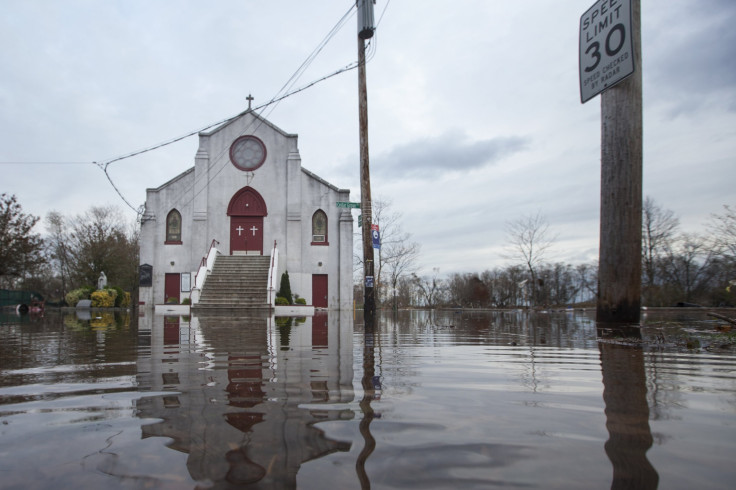FEMA Opens Review To Every Single Hurricane Sandy Flood Insurance Claim After Fraud Allegations

Bowing to mounting pressure from U.S. lawmakers to compensate all Hurricane Sandy victims who may have been cheated out of flood insurance payments, FEMA will reopen as many as 144,000 flood insurance claims to review. At the same time, a top agency official has resigned, following allegations that widespread fraud cost homeowners crucial payouts in the wake of the 2012 storm.
FEMA administrator Craig Fugate agreed to reassess every single Sandy flood claim during a meeting Wednesday with the four U.S. senators from New York and New Jersey. Fugate has also accepted the resignation of David Miller, the associate administrator for the Federal Insurance and Mitigation Administration, which oversees the flood insurance program, an agency spokesperson confirmed.
In addition to Miller's departure, the agency confirmed that Edward Connor, a former deputy associate administrator for federal insurance who headed the flood insurance program, has retired.
The review process will expand the reach of additional payouts beyond the 2,200 Sandy victims who filed lawsuits on their claims, and who have generated massive attention over the way their claims were handled by private insurers working for FEMA.
“This is a significant turnaround for the thousands of Sandy survivors who have been victimized not only by the storm, but by FEMA, insurance companies and their subcontractors who systemically lowballed claims," Sen. Robert Menendez (D-N.J.) said in an emailed statement. Joining him to meet with Fugate on Capitol Hill were fellow New Jersey Democrat Sen. Cory Booker, Sen. Charles Schumer (D-N.Y.) and Sen. Kirsten Gillibrand (D-N.Y.).
"FEMA also made clear that it plans to hold accountable all those who were involved in the program that may have facilitated or fostered this fraudulent behavior," according to a statement by Schumer.
The agency oversees the National Flood Insurance Program, in which dozens of private insurance companies administer claims for the vast majority of 5.3 million government-backed policies. The program serves as the main source of flood insurance for homeowners throughout the U.S.
Allegations that insurers relied on fraudulently altered engineering reports when assessing Sandy claims prompted FEMA to initiate an immense, ongoing settlement effort with homeowners who filed lawsuits. The New York attorney general's office is conducting a criminal probe. The inspector general's office for the Department of Homeland Security, which houses FEMA, is carrying out an investigation, as well.
FEMA will develop the wider claims review process over the next several weeks, according to lawmakers. Once that process is in place, the agency will mail letters to all Sandy victims who filed flood insurance claims. Anyone who believes they were defrauded, or were paid unfairly, will have the opportunity to submit their claim for review.
The letter will essentially convey: "Here's the process, and if you feel that if you were treated unfairly, pursue it," Menendez said after the meeting.
Menendez said he did not yet have a specific date for the mailing of the letters, but, he said, "We are going to make everyone fully aware."
Homeowners who seek a new review of their claims will not face the same "abusive" process they encountered before, according to Steve Mostyn, a Texas trial attorney who is leading current settlement negotiations on behalf of policyholders who filed suits in court.
"Many of these people have already been through this process and they’ve been beat up by it,” said Mostyn, who is now helping to craft the details of the wider review. This time around, he added, "I want something that works efficiently and works fair, and doesn’t turn into something that is just another point of frustation for these folks.”
Mostyn's Houston-based firm has reviewed approximately 1 million pages of documents that insurers were forced to disclose about their handling of Sandy claims. During meetings this week in Washington, D.C., Mostyn said he showed FEMA officials multiple cases in which homes had totally collapsed, but yet the homeowners only received insurance payouts of around $70,000. A homeowner who buys a policy for the full limit is insured for $250,000 on the structure of the house.
In another pattern Mostyn said he demonstrated during the meetings, "We showed the sales tax was not paid on 90 percent of these claims." Mostyn is also representing a New Jersey homeowner who recently alleged that a common insurance claims document -- an adjuster's report -- was fraudulently altered and hidden in a case that could have far-reaching implications for other policyholders.
Booker, after meeting with Fugate Wednesday, said that FEMA is "even to the point now where they’re suspicious of some of the software they use to asses damages and asses reimbursements.” A FEMA spokesperson declined to comment on this point.
As officials prepare to reopen the entirety of Sandy flood insurance claims to review requests, lawmakers are also gearing up to address long-term reforms to a program that has partnered with private insurance companies since 1983. A task force examining structural changes to the National Flood Insurance Program, led by Menendez, will hold its first meeting April 13.
Fugate "has come to realize that they've been running it as an insurance industry would run it," Menendez said, "and of course the insurance industry is always looking to mitigate claims, not to make people whole."
© Copyright IBTimes 2025. All rights reserved.





















